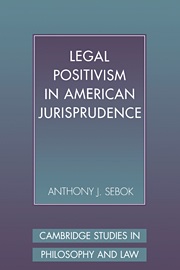Book contents
- Frontmatter
- Contents
- Acknowledgments
- 1 Why Study Legal Positivism?
- 2 Positivism and Formalism
- 3 The Varieties of Formalism
- 4 Legal Process and the Shadow of Positivism
- 5 The False Choice Between the Warren Court and Legal Process
- 6 Fundamental Rights and the Problem of Insatiability
- 7 New Legal Positivism and the Incorporation of Morality
- Index
3 - The Varieties of Formalism
Published online by Cambridge University Press: 16 October 2009
- Frontmatter
- Contents
- Acknowledgments
- 1 Why Study Legal Positivism?
- 2 Positivism and Formalism
- 3 The Varieties of Formalism
- 4 Legal Process and the Shadow of Positivism
- 5 The False Choice Between the Warren Court and Legal Process
- 6 Fundamental Rights and the Problem of Insatiability
- 7 New Legal Positivism and the Incorporation of Morality
- Index
Summary
DOES LEGAL FORMALISM EXIST?
The first step in my argument is to show that, as a historical matter, legal positivism was represented in the United States by the theory of law we now call formalism. I have defined positivism (partially through its historical origins in Bentham and Austin), and I have proven that it operated as a placeholder for formalism in jurisprudential argument at the turn of the century, but I have not yet defined formalism. In this chapter I shall define formalism, but I shall do so in a particularly indirect way. It is naturally crucial to my argument that I construct, as I did with positivism, a relatively precise set of conditions that distinguish formalism as a theory of law, and it is even more crucial for my argument that this list overlaps – more or less – the three conditions I attributed to positivism in Chapter 2. I cannot simply list the elements of legal formalism as I did with positivism because unlike positivism, formalism was not codified by a set of theorists as focused or confident as Bentham and Austin. As we shall see later, although there is little doubt as to the identity of formalism's chief architects (namely Langdell and Beale), they were not nearly as self-conscious about their roles as the founders of a movement as were Bentham and Austin. Hence, no formalist left behind a document as foundational as either Bentham's Of the Laws in General or Austin's Province.
- Type
- Chapter
- Information
- Legal Positivism in American Jurisprudence , pp. 48 - 112Publisher: Cambridge University PressPrint publication year: 1998

